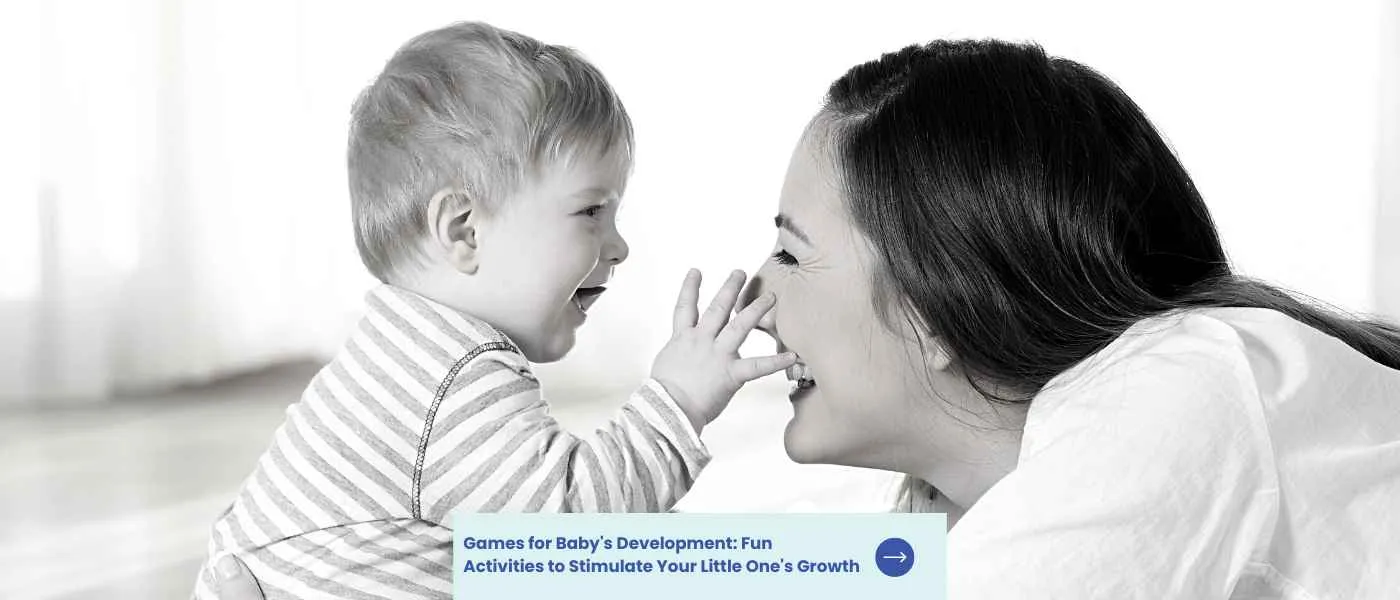Babies are naturally curious and eager to learn about the world around them. Playing games with your little one is an excellent way to encourage their development and promote their physical, cognitive, and social skills.
As a parent, you may wonder what baby games are best to play with your little one. In this article, we have compiled a list of fun and engaging games that will help you stimulate your baby’s growth and keep them entertained.
Key Takeaways on Baby Games
- Playing games even as simple as making a funny face can promote their development and stimulate growth
- Play helps a baby develop language skills, visual tracking skills, listening skills, and more.
- Keeping it simple, following the baby’s lead, and being patient can help them reach developmental milestones for a happy and healthy childhood.
Why Play Games with Your Baby?
Playing games is an important part of a baby’s growth and development. Not only are they a fun way to pass the time, but they also provide a range of benefits for a baby’s cognitive, motor, social, and emotional development.
You may not entertain older babies with the same games you played with them during their early weeks, you still need to find free time to play with our bundles of joy. Play doesn’t always involve toys. You can simply talk to your child, sing a song, blow bubbles or blow raspberries.

Cognitive Development
Playing games can help improve a baby’s cognitive abilities in several ways. First and foremost, games can help develop a baby’s memory and problem-solving skills. When playing games, babies are required to remember the rules and figure out how to win. This type of mental exercise can help improve their memory and problem-solving skills over time.
Games can also help improve a baby’s attention span and ability to focus. When playing games, babies need to concentrate on the task at hand and ignore distractions. This can help develop their attention span and ability to focus, which can be beneficial in other areas of their life, such as when learning new skills or sitting still in class.
There are many games that can help improve a baby’s cognitive development. For example, playing with stacking toys can help improve a baby’s problem-solving skills as they try to figure out how to stack the toys in the correct order.
Playing with shape sorters can help develop their memory as they learn to remember which shape goes in which hole. Reading books together can help improve their attention span and language development as they listen to the words and look at the pictures.
Motor Development
Playing games can also help improve a baby’s motor skills. When playing game such as stacking plastic cups or play ball, babies are required to use their hands and fingers to manipulate objects, which can help improve their fine motor skills. They are also required to move their little body in different ways, which can help improve their gross motor skills.
You don’t even have to buy toys. You can use empty boxes, wooden spoons or a cardboard box to your baby’s daily routine game. These household items offer valuable learning experience. Your baby learns through play, and play shouldn’t be expensive.

Social and Emotional Development
Playing games can also help improve a baby’s social and emotional development. When playing games with others, babies learn to take turns, share, and cooperate with others. This can help improve their social skills and their ability to form relationships with others.
Playing games can also help improve a baby’s emotional development. When playing games, babies learn to deal with disappointment, frustration, and other emotions that come with losing or not getting their way. This can help improve their emotional resilience and their ability to regulate their emotions.
There are many games that can help improve a baby’s social and emotional development. For example, playing with toys that require turn-taking, such as a toy telephone or tea set, can help improve their skills as they learn to take turns and share.
Playing hide and seek can help improve their emotional resilience as they learn to deal with disappointment and frustration when they are not able to find the person they are looking for.
Fun Play Activities and Games for Babies
Here are a few games that will entertain baby:
Sensory Games
Sensory games involve activities that stimulate a baby’s senses, including touch, sight, sound, smell, and taste. These games can be beneficial for a baby’s cognitive, physical, and emotional development.
Sensory games can help improve a baby’s cognitive skills by providing opportunities to explore and learn about different textures, colors, and shapes.
Sensory play involving a soft ball or a toy with different textures can also help improve a baby’s physical development by encouraging them to use their senses to explore their environment and preparing them for future milestones. Sensory play can also be calming and therapeutic, helping babies to regulate their emotions.
There are many different sensory games that parents can play with their babies. For example, playing with textured toys, such as a soft blanket or a textured ball, can help a baby explore different textures. Playing with colorful toys, such as a rainbow stacking toy or a set of brightly colored blocks, can help a baby explore different colors. Playing with toys that make noise, such as a rattle or a musical toy, can help a baby explore different sounds.

Tummy Time Games
Tummy time is an important part of a baby’s physical development. It involves placing a baby on their stomach on a play mat while they are awake and supervised. Tummy time can help improve a baby’s strength and coordination, as well as gives the baby practice to crawl and eventually walk. Tummy time can also help prevent flat spots on the back of a baby’s head.
There are many different games that parents can play with their babies during tummy time. For example, playing with a soft toy or a ball can encourage a baby to reach out and grab the toy, helping to improve their coordination. Placing a mirror in front of a baby during tummy time can also be beneficial, as it can help them practice lifting their head and neck.
Peek-a-boo Games
Babies love faces and they love peekaboo games. It involves hiding your face behind your hands or a blanket and then revealing your face with a surprise “peekaboo!” Peekaboo games can help improve a baby’s cognitive and emotional development by teaching them about social interaction, and cause and effect.
There are many different variations of peekaboo games that parents can play with their babies. For example, hiding a toy behind a blanket and then revealing the toy can be a fun way to play peekaboo or make different silly faces every time you re-appear. You can also try reappearing from different directions to add variety.
Playing peekaboo with a stuffed animal or a picture book can also be entertaining for babies, too.

Object Permanence Games
Object permanence is the understanding that objects continue to exist even when they are out of sight. It is an important cognitive skill that develops during the first year of life. These games can help develop a baby’s understanding of the world around them and improve their cognitive development.
There are many different permanence games that parents can play with their babies. For example, playing peekaboo with a toy can help teach a baby about this important skill. Hiding a toy under a blanket and then revealing it can also be a fun way to play an object permanence game. Playing with toys that have hidden compartments or require a baby to figure out how to open them can also be beneficial for developing object permanence skills.
Tips for Playing Games with Your Baby
Playing games with your baby can be a fun and rewarding experience for both you and your little one. However, it’s important to keep in mind that not all games are suitable for all ages, and creating a safe and stimulating environment is crucial. In this section, we will provide some tips for playing games with your baby.
Choosing age-appropriate games
When choosing games to play with your baby, it’s important to choose games that are appropriate for their age and developmental level. Newborns, for example, are not yet able to play complex games that require them to follow rules or take turns.
Instead, simple games like peekaboo or tickling can be fun and engaging. As your baby grows and develops, you can introduce more complex games that require problem-solving or exploration.

Creating a safe and stimulating environment
When playing games with your baby, it’s important to create a safe and stimulating environment. Make sure that the area where you’re playing is free from hazards, such as sharp objects or loose cords.
You can also create a stimulating environment by providing a variety of toys and games that your baby can explore. Try to create a space that encourages your baby to move around and explore their surroundings.
Making the best games fun and interactive
When playing games with your baby, it’s important to make the games fun and interactive. A baby loves funny noises so clap baby’s hands together or add animal sounds during baby play. Play nursery rhymes or sing itsy bitsy spider using stuffed animals and soft toys.
Smile and make eye contact with your baby, and use a playful tone of voice. This will help keep your baby engaged and interested in the game.
To enjoy a gentle dance session with your infant, play some of your preferred music. Embrace your baby gently as you move to the beat and hum the lyrics. This activity can assist your little one in becoming familiar with novel sounds and vocabulary in a peaceful manner.
You can also make the games more interactive by involving other family members or friends. For example, you can play a game of “pass the baby”, little piggy, or have other family members join in on a game of peekaboo.

Following your baby’s lead
When playing games with your baby, it’s important to follow your baby’s lead. Young babies have their own unique personalities and interests, and it’s important to respect these. If your baby seems more interested in exploring a particular toy or object than playing a game, let them explore.
Similarly, if your baby seems tired or fussy, it’s okay to take a break from playing games and cuddle or sing to them instead. And if your baby is tired, hold baby and play slow clapping games such as patty cake or pat-a-cake while making facial expressions and gently touching your baby’s nose.
FAQs on Best Baby Games
What age can you start playing games with your baby?
You can start playing games with your baby as early as three months old.
What games help with communication skills development?
Singing, reading bedtime stories or even as simple as talking during feeding or diaper changes can help your baby learn about new words, conversation and language.
How long should playtime be for babies?
Playtime for babies should be short and frequent, around 10-15 minutes several times a day.




